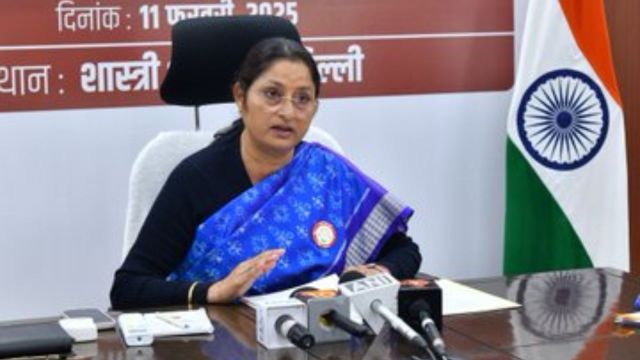‘Modi govt using tech to ensure transparency’: Minister Annapurna Devi flays Congress for opposing facial recognition tech in take-home ration distribution
Congress' Jairam Ramesh alleged that the Central Government was “using technology to exclude” vulnerable sections of society from social welfare entitlements.
 Women and Child Development Minister Annapurna Devi (Image: X/@Annapurna4BJP)
Women and Child Development Minister Annapurna Devi (Image: X/@Annapurna4BJP)Women and Child Development (WCD) Minister Annapurna Devi on Monday hit out at the Congress that slammed the Centre for making facial recognition mandatory for distributing take-home ration through Anganwadi centres. She said the Modi government was using technology to ensure transparency and inclusion in welfare schemes.
The Congress alleged that the Central Government was “using technology to exclude” vulnerable sections of society from social welfare entitlements.
In a communication to States and Union Territories last month, the WCD ministry stated that facial recognition will be mandatory for take-home ration distribution from July 1. The take-home ration (THR) scheme is meant for pregnant and lactating women.
Additionally, facial recognition will also be made mandatory at the time of registration of beneficiaries of Anganwadi centres from August 1. For children (Anganwadis serve children from the ages of 0-6), the Aadhaar of the child’s parent or guardian, along with face recognition, will be a precondition for registration. The child’s Aadhaar will not be considered at the time of registration, going by the communication. In addition to the adult’s facial recognition, the child’s picture with “liveliness detection” will be captured for children in the 3-6 age group.
Congress communications in-charge Jairam Ramesh wrote on X on Monday: “The Modi government is systematically using technology to exclude the most vulnerable sections of society from social welfare entitlements. Now, pregnant women face a new hurdle: facial recognition technology (FRT) for basic and legal entitlements under the NFSA! (National Food Security Act).”
Ramesh stated that technologies such as Aadhaar-based Payment System (ABPS), the National Mobile Monitoring System (NMMS) app, etc have proven to be exclusionary or have failed.
“The Parliamentary Standing Committee on Education, Women, Children, Youth, and Sports in its 365th Report on the Demand for Grants for the Women and Child Development Ministry had noted that the introduction of ABPS in the Pradhan Mantri Matru Vandana Yojana (PMMVY) impacted the ability of eligible beneficiaries (i.e., pregnant and lactating women) to benefit from the scheme. The number of beneficiaries paid has dipped drastically, from 96 lakh women in FY19-20 to 27 lakh women in FY23-24,” he wrote.
Responding to his post, WCD Minister Annapurna Devi wrote on X: “With the help of modern technologies like Facial Recognition System (FRS), Biometric and Aadhaar, the government today is successful in reaching last mile beneficiaries.”
“It is wrong to say that the use of technology has led to a decline in PMMVY beneficiaries,” she wrote, adding that there were 72.05 lakh first-time beneficiaries of the scheme in 2019-20, 80.48 lakh in 2024-25, and over 27 lakh beneficiaries in the first quarter of 2025-26.












